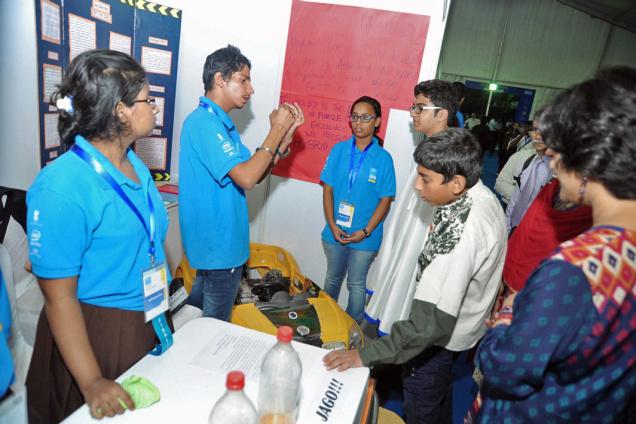Bangalore, November 22: Amidst a veritable chorus of oohs and aahs, a quadrotor took to the skies on Thursday morning, slowly and gracefully. In the middle of the crowd was Rohit Dey, a student of Kendriya Vidyalaya NAL campus. He seemed completely at ease, taking control of a craft half his size in front of the sizeable audience that had gathered to watch his impromptu demonstration. When, after a series of deft manoeuvres, the craft finally touched down gently, the applause seemed never ending.
This was just one of the many fascinating creations on display at the Initiative for Research and Innovation in Science (IRIS) National Fair 2013 at Christ University. The four-day event was inaugurated here on Thursday. Organised jointly by the Union government’s Department of Science and Technology, Intel and CII, the fair was a carnival of innovation.
As many as 200 schoolchildren from across the country had been invited to showcase their projects after a gruelling selection process, and they definitely did not disappoint.
The ideas were extremely diverse – from using latex as a fuel to building an intelligent wheelchair. Broadly classified into disciplines such as animal sciences, social sciences, physics, chemistry, mathematics and engineering, the projects on display showed just how much potential India’s classrooms host.
Of the 200 students who participated at the fair, 17 will participate at the International Science and Engineering Fair (ISEF) at Los Angeles next year. Their names will be announced on Sunday.
Intel authorities announced that in keeping with the contest’s traditions, NASA will name a minor planet each after these students.
Solving problems
Another project on display at the fair was that of Arpan Ghosh, a student from Delhi. He says he has already begun collaborating with security agencies over his project that uses unmanned aerial vehicles for bomb disposal.
Other projects aim at solving equally large problems, such as automating the public distribution system, and visualising sounds to aid people with hearing impairment.
At the inaugural session of the fair, there was a video conference with Sam Pitroda, chairperson of the National Innovation Council. He highlighted the immense power of ideas, and the implications of innovation on a personal, institutional and national level. He urged youngsters to apply what they learn to generate new ideas.
Senior Intel executive Ashutosh Chadha spoke about the company’s commitment to education, pointing to earlier initiatives such as the Vigyaan Yatra, in which a bus equipped with latest technology and teachers toured the State providing a foundation in scientific research to over 4,000 students and 250 teachers.
The exhibition will be open to the public on Saturday.

